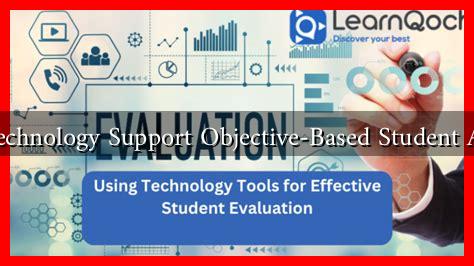-
Table of Contents
- How Can Technology Support Objective-Based Student Assessments?
- The Shift Towards Objective-Based Assessments
- Benefits of Technology in Objective-Based Assessments
- Technological Tools Supporting Objective-Based Assessments
- Case Studies: Successful Implementation of Technology in Assessments
- Challenges and Considerations
- Conclusion
How Can Technology Support Objective-Based Student Assessments?
In the rapidly evolving landscape of education, technology plays a pivotal role in enhancing the assessment process. Objective-based student assessments focus on measuring students’ understanding and skills against predefined learning objectives. This article explores how technology can support these assessments, making them more efficient, accurate, and beneficial for both educators and students.
The Shift Towards Objective-Based Assessments
Objective-based assessments are designed to evaluate specific competencies and learning outcomes. Unlike traditional assessments, which may rely heavily on subjective grading, objective assessments provide a clearer picture of student performance. The integration of technology into this process can streamline assessment creation, administration, and analysis.
Benefits of Technology in Objective-Based Assessments
Technology offers numerous advantages that can enhance the effectiveness of objective-based assessments:
- Efficiency: Automated assessment tools can significantly reduce the time educators spend on grading and feedback.
- Data Analysis: Advanced analytics can provide insights into student performance trends, helping educators identify areas for improvement.
- Personalization: Technology allows for adaptive assessments that adjust difficulty based on student responses, catering to individual learning paces.
- Accessibility: Online assessments can be accessed from anywhere, making it easier for students to participate and for educators to reach a wider audience.
Technological Tools Supporting Objective-Based Assessments
Several technological tools and platforms have emerged to support objective-based assessments effectively:
- Learning Management Systems (LMS): Platforms like Moodle and Canvas allow educators to create, administer, and grade assessments seamlessly.
- Online Quiz Tools: Tools such as Kahoot! and Quizizz enable the creation of engaging quizzes that can assess student knowledge in real-time.
- Data Analytics Software: Programs like Tableau and Google Data Studio can analyze assessment data, providing insights into student performance and learning gaps.
- Adaptive Learning Technologies: Systems like DreamBox and Smart Sparrow adjust the difficulty of assessments based on student performance, ensuring a personalized learning experience.
Case Studies: Successful Implementation of Technology in Assessments
Several educational institutions have successfully integrated technology into their assessment processes, yielding positive results:
- University of Michigan: Implemented an online assessment system that reduced grading time by 50% and improved student feedback mechanisms.
- Georgia State University: Utilized predictive analytics to identify at-risk students, leading to a 10% increase in graduation rates.
- EdTech Startups: Companies like Gradescope have revolutionized the grading process for large classes, allowing for quicker and more objective evaluations.
Challenges and Considerations
While technology offers numerous benefits, there are challenges to consider:
- Equity: Not all students have equal access to technology, which can create disparities in assessment opportunities.
- Data Privacy: The collection and analysis of student data raise concerns about privacy and security.
- Training: Educators may require training to effectively use new technologies, which can be a barrier to implementation.
Conclusion
Technology has the potential to transform objective-based student assessments, making them more efficient, personalized, and insightful. By leveraging various tools and platforms, educators can enhance the assessment process, ultimately leading to improved student outcomes. However, it is crucial to address challenges such as equity and data privacy to ensure that all students benefit from these advancements. As we continue to embrace technology in education, the focus should remain on creating a fair and effective assessment environment that supports every learner’s journey.
For further reading on the impact of technology in education, visit Edutopia.

